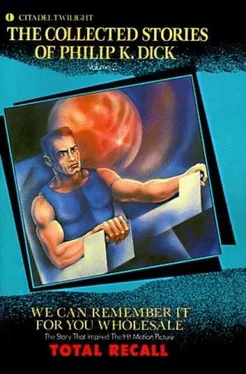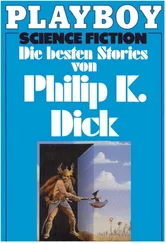Haskel nodded. He began to disassemble the Ink Works, ignoring his wife and Doctor Tyler. "But why?"
Haskel grunted impatiently. "No time."
Doctor Tyler had begun to look worried. "Do I understand you're too busy for your job?"
"That's right."
"Too busy doing what?" Tyler's voice rose; he was trembling nervously. "Working down here on this town of yours? Changing things?"
"Go away," Haskel muttered. His deft hands were assembling a lovely little Langendorf Bread Factory. He shaped it with loving care, sprayed it with white paint, brushed a gravel walk and shrubs in front of it. He put it aside and began on a park. A big green park. Woodland had always needed a park. It would go in place of State Street Hotel.
Tyler pulled Madge away from the table, off in a corner of the basement. "Good God." He lit a cigarette shakily. The cigarette flipped out of his hands and rolled away. He ignored it and fumbled for another. "You see? You see what he's doing?"
Madge shook her head mutely. "What is it? I don't -"
"How long has he been working on this? All his life?"
Madge nodded, white-faced. "Yes, all his life."
Tyler's features twisted. "My God, Madge. It's enough to drive you out of your mind. I can hardly believe it. We've got to do something."
"What's happening?" Madge moaned. "What -"
"He's losing himself into it." Tyler's face was a mask of incredulous disbelief. "Faster and faster."
"He's always come down here," Madge faltered. "It's nothing new. He's always wanted to get away."
"Yes. Get away." Tyler shuddered, clenched his fists and pulled himself together. He advanced across the basement and stopped by Verne Haskel.
"What do you want?" Haskel muttered, noticing him.
Tyler licked his lips. "You're adding some things, aren't you? New buildings."
Haskel nodded.
Tyler touched the little bread factory with shaking fingers. "What's this? Bread? Where does it go?" He moved around the table. "I don't remember any bread factory in Woodland." He whirled. "You aren't by any chance improving on the town? Fixing it up here and there?"
"Get the hell out of here," Haskel said, with ominous calm. "Both of you."
"Verne!" Madge squeaked.
"I've got a lot to do. You can bring sandwiches down about eleven. I hope to finish sometime tonight."
"Finish?" Tyler asked.
"Finish," Haskel answered, returning to his work.
"Come on, Madge." Tyler grabbed her and pulled her to the stairs. "Let's get out of here." He strode ahead of her, up to the stairs and into the hall. "Come on!" As soon as she was up he closed the door tightly after them.
Madge dabbed at her eyes hysterically. "He's gone crazy, Paul! What'll we do?"
Tyler was in deep thought. "Be quiet. I have to think this out." He paced back and forth, a hard scowl on his features. "It'll come soon. It won't be long, not at this rate. Sometime tonight."
"What? What do you mean?"
"His withdrawal. Into his substitute world. The improved model he controls. Where he can get away."
"Isn't there something we can do?"
"Do?" Tyler smiled faintly. "Do we want to do something?"
Madge gasped. "But we can't just -"
"Maybe this will solve our problem. This may be what we've been looking for." Tyler eyed Mrs Haskel thoughtfully. "This may be just the thing."
It was after midnight, almost two o'clock in the morning, when he began to get things into final shape. He was tired – but alert. Things were happening fast. The job was almost done.
Virtually perfect.
He halted work a moment, surveying what he had accomplished. The town had been radically changed. About ten o'clock he had begun basic structural alterations in the layout of the streets. He had removed most of the public buildings, the civic center and the sprawling business district around it.
He had erected a new city hall, police station, and an immense park with fountains and indirect lighting. He had cleared the slum area, the old run-down stores and houses and streets. The streets were wider and well-lit. The houses were now small and clean. The stores modern and attractive – without being ostentatious.
All advertising signs had been removed. Most of the filling stations were gone. The immense factory area was gone, too. Rolling countryside took its place. Trees and hills and green grass.
The wealthy district had been altered. There were now only a few of the mansions left – belonging to persons he looked favorably on. The rest had been cut down, turned into uniform two-bedroom dwellings, one story, with a single garage each.
The city hall was no longer an elaborate, rococo structure. Now it was low and simple, modeled after the Parthenon, a favorite of his.
There were ten or twelve persons who had done him special harm. He had altered their houses considerably. Given them war-time housing unit apartments, six to a building, at the far edge of town. Where the wind came off the bay, carrying the smell of decaying mud-flats.
Jim Larson's house was completely gone. He had erased Larson utterly. He no longer existed, not in this new Woodland – which was now almost complete.
Almost. Haskel studied his work intently. All the changes had to be made now. Not later. This was the time of creation. Later, when it had been finished, it could not be altered. He had to catch all the necessary changes now – or forget them.
The new Woodland looked pretty good. Clean and neat – and simple. The rich district had been toned down. The poor district had been improved. Glaring ads, signs, displays, had all been changed or removed. The business community was smaller. Parks and countryside took the place of factories. The civic center was lovely.
He added a couple of playgrounds for smaller kids. A small theater instead of the enormous Uptown with its flashing neon sign. After some consideration he removed most of the bars he had previously constructed. The new Woodland was going to be moral. Extremely moral. Few bars, no billiards, no red light district. And there was an especially fine jail for undesirables.
The most difficult part had been the microscopic lettering of the main office door of the city hall. He had left it until last, and then painted the words with agonizing care:
MAYOR VERNON R. HASKEL
A few last changes. He gave the Edwardses a '39 Plymouth instead of a new Cadillac. He added more trees in the downtown district. One more fire department. One less dress shop. He had never liked taxis. On impulse, he removed the taxi stand and put in a flower shop.
Haskel rubbed his hands. Anything more? Or was it complete… Perfect… He studied each part intently. What had he overlooked?
The high school. He removed it and put in two smaller high schools, one at each end of town. Another hospital. That took almost half an hour. He was getting tired. His hands were less swift. He mopped his forehead shakily. Anything else? He sat down on his stool wearily, to rest and think.
All done. It was complete. Joy welled up in him. A bursting cry of happiness. His work was over. "Finished!" Verne Haskel shouted.
He got unsteadily to his feet. He closed his eyes, held his arms out, and advanced toward the plywood table. Reaching, grasping, fingers extended, Haskel headed toward it, a look of radiant exaltation on his seamed, middle-aged face.
Upstairs, Tyler and Madge heard the shout. A distant booming that rolled through the house in waves. Madge winced in terror. "What was that?"
Tyler listened intently. He heard Haskel moving below them, in the basement. Abruptly, he stubbed out his cigarette. "I think it's happened. Sooner than I expected."
"It? You mean he's -"
Tyler got quickly to his feet. "He's gone, Madge. Into his other world. We're finally free."
Читать дальше










